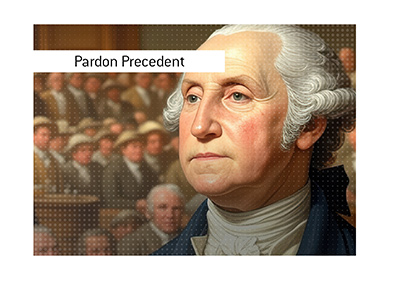President George Washington Pardoned Weigel and Mitchell For Their Part in Whiskey Rebellion
 On December 8th, 1795, President George Washington delivered the 7th State of the Union Address in the history of the United States.
On December 8th, 1795, President George Washington delivered the 7th State of the Union Address in the history of the United States. During this address, President Washington referred to the November 2nd, 1795 pardons of John Mitchell and Philip Weigel, who had been sentenced to hang after having been found guilty for taking part in the "Whiskey Rebellion".
Washington stated that the "misled have abandoned their errors" and that "moderation and tenderness" had won out in his decision to pardon the two men.
The pardons of Mitchell and Weigel would be the first two Presidential pardons in the history of the United States.
-
In 1791, Congress passed the "Excise Whiskey Tax".
This was the first ever tax on a domestic product and the revenues were to be used for paying off the debt accumulated during the Revolutionary War.
Farmers, many of whom were poor, realized that the tax would significantly harm their businesses.
These farmers were not happy.
The federal government hired revenue collectors to go and pick up the tax money to return it to Washington but the farmers weren't having it.
In fact, many refused to acknowledge the tax at all, and the welcome for the revenue collectors was less and less friendly.
-
After years of discontent, things came to a head on July 16th, 1795, when a large crowd of tax protestors arrived at the house of General John Neville, who was Inspector of the Revenue.
100 protestors showed up to the front door of General Neville, who opened fire on the crowd and killed one of the protestors.
Shortly after, a group of 500 protestors showed up, demanding that General Neville step down from his post and turn over his books. The protestors lit Neville's house on fire and he eventually gave himself up.
After a few months of attempted negotiations, a militia force, led by President Washington himself, arrived to quell the protest. It worked.
A message needed to be sent by Washington and an estimated 150 "boys and men" who were thought to have taken part in the raid on General Neville's house were arrested.
The news was particularly bad for John Mitchell and Philip Weigel, as they were spotted by eyewitnesses as having taken part in the riot at Neville's house, and they were convicted and sentenced to hanging.
-
While others wanted to take a hard-line approach to prisoners like Mitchell and Weigel, President Washington elected to show forgiveness as the nation attempted to move forward from the incident.
Mitchell and Weigel received their Presidential pardons, and the US government successfully showed to the country that they had the might to collect excise taxes from its citizens.
Filed under: General Knowledge



